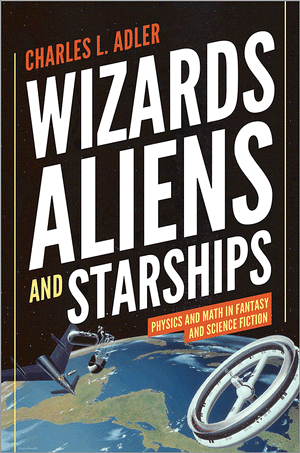Title : Wizards, Aliens, and Starships:
Physics and Math in Fantasy and Science Fiction
Author : Charles L. Adler
Price : $29.95 / £19.95
Publisher: Princeton University Press
ISBN : 9780691147154
Pages : 392
From tele-portation and space elevators to alien contact and interstellar travel, science fiction and fantasy writers have come up with some brilliant and innovative ideas. Wizards, Aliens, and Starships delves into the most extraordinary details in science fiction and fantasy--such as time warps, shape changing, rocket launches, and illumination by floating candle--and shows readers the physics and math behind the phenomena.
With simple mathematical models, and in most cases using no more than high school algebra, Charles Adler ranges across a plethora of remarkable imaginings, from the works of Ursula K. Le Guin to Star Trek and Avatar, to explore what might become reality. Adler explains why fantasy in the Harry Potter and Dresden Files novels cannot adhere strictly to scientific laws, and when magic might make scientific sense in the muggle world.
Adler examines space travel and wonders why it isn't cheaper and more common today. He also discusses exoplanets and how the search for alien life has shifted from radio communications to space-based telescopes.Throughout, he cites an abundance of science fiction and fantasy authors, and includes concise descriptions of stories as well as an appendix on Newton's laws of motion.
This is a book for science fiction enthusiasts, and can be enjoyed by anyone with a smattering of mathematics. Adler rightly states that it helps to be familiar with the various forms of energy and power and how they can be transformed. Possibly a little more than this would allow the reader to fully appreciate and grasp the detail and not be intimidated by the frequent equations and graphs that punctuate the text.
At the same time, Wizards, Aliens and Starships is not a textbook, nor is it written as such. The entertaining opening section on the physics underlying the magic in fantasy writing investigates some common dilemmas. The book concludes with a discussion of how long humanity can expect to survive and the future of the universe.
The underlying argument is that while many of these ideas are physically possible.
Chapters in the book: http://press.princeton.edu
Review Courtesy: http://press.princeton.edu, http://www.timeshighereducation.co.uk



No comments:
Post a Comment